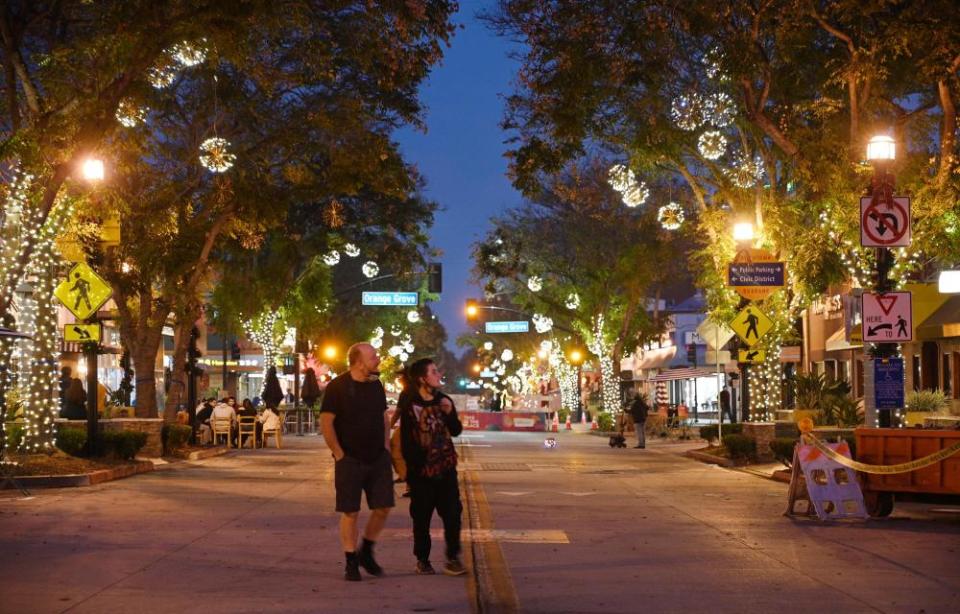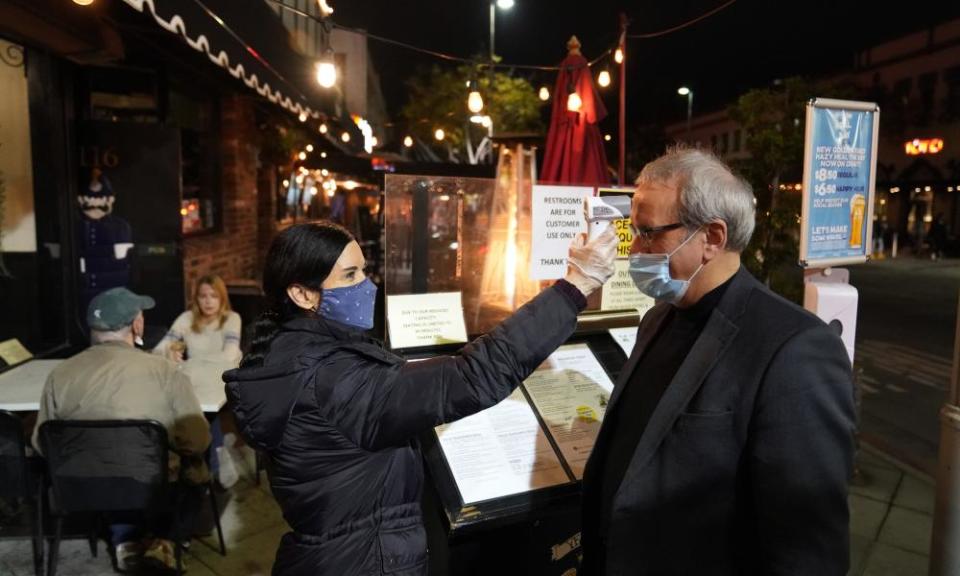'Ridiculous double standard': LA residents condemn maze of Covid restrictions

Jeffrey Merrihue had just finished installing $80,000 worth of dining booths on the street outside his informal Italian eatery blocks away from the Pacific Ocean when word came down that Los Angeles county was instituting a three-week ban on outdoor dining.
Not only was he not amused – he thought the decision was misguided and desperately unfair.
“Are you kidding me?” Merrihue said, sitting in one of the booths that the city of Santa Monica encouraged him to build on a line of metered parking spots. “I have to close outdoor dining, while people are mobbing indoor malls? When supermarket shoppers are passing inches away from each other and coughing on the broccoli? It’s a ridiculous double standard.”
Southern California’s warm winter weather and plentiful outdoor space should, in theory, act as a buffer against the virus’s worst ravages. The data, though, tells a different story.
Los Angeles county, with a population of 10 million people the most populous in the country, reported more than 7,800 new cases on Thursday, up from 6,000 new cases the day before and up alarmingly from mid-October, when the daily rate was below 2,000. The number of people hospitalized, meanwhile, has surged from about 1,000 a month ago to more than 2,500. Local officials fear they could run out of hospital beds by Christmas.

Poorer, densely populated areas of the city, where family members are more likely to be essential workers or live in close quarters, have been struck harder than more affluent parts of the county like Santa Monica, Beverly Hills and West Hollywood, where many people work remotely from home and live either alone or in single family units.
Covid fatigue, nine months after the first lockdowns, has made people observably less rigorous about basic safety measures such as hand-washing and keeping an appropriate distance, and it almost certainly helps explain why public pleas to avoid travel and big family get-togethers over last week’s Thanksgiving were roundly ignored – in some cases by the very officials issuing the warnings.
In response, Los Angeles county last week shut down restaurant dining and urged people to stay at home. The city followed up with a similar stay-at-home order days later. On Thursday, the California governor, Gavin Newsom, announced a regional-stay-at home order for areas in the state, triggered when intensive care units fall below 15% capacity. And on Friday, several Bay Area counties issued stay-at-home orders even before reaching that benchmark.
While California’s sweeping lockdown orders at the start of the pandemic were largely met with praise for their decisiveness, frustrations with the new measures have become increasingly common – and are rapidly reaching fever pitch in Los Angeles.
Related: California plans sweeping stay-at-home order as Covid cases surge
Even before the latest restrictions, a drive through some of the city’s vibrant neighborhoods could be a depressing affair, with an eerie, decidedly un-urban silence hanging over deserted streets dotted with newly vacated storefronts and boarded up windows.
The decision of many jurisdictions to allow restaurants like Merrihue’s to spill out into the roadway provided one of the few bright spots, but now most of the makeshift wood and perspex structures constructed over the summer lie forlorn and empty.
Beloved restaurants have gone out of business all over the city, including a Middle Eastern cafe across the street from Merrihue’s place and a high-end fish restaurant with stunning views over the ocean just a few blocks away next to the Santa Monica Pier.
The pier itself, one of the LA area’s most recognizable landmarks, is still going strong, however, packed with tourists and residents, many of whom are maskless and stay significantly less than 6ft apart. To date, nobody has shown much interest in policing them – much less closing the place down.
To many, it is indicative of inconsistent and illogical applications of anti-Covid strictures by political leaders facing pressure from a variety of unions and industry lobby groups.
Why else, residents say, would a high-risk venture like in-person grocery shopping be allowed to keep going while other, seemingly low-risk ones like children’s outdoor playgrounds have been padlocked and wrapped in police caution tape? How, before the latest emergency, could gyms and nail salons be allowed to open while schools, even ones with large playing fields and outdoor corridors that could host open-air classrooms, remained closed?
Merrihue is typical of this new sort of angry citizen: willing to take his share of pain for the public good but not to suffer needlessly because of what he sees as official corruption and incompetence. Outdoor dining – socially distanced, with waiters wearing face guards – was exactly what public authorities should be encouraging in a pandemic, he argued.

Now, he has had to lay off 12 of his 20 workers. And, last weekend, he received multiple visits – plus multiple fines – from city inspectors who objected to passersby and homeless people continuing to sit in the freshly built booths outside his restaurant. It probably didn’t help that Merrihue kept his outdoor heaters on and played music, or that he erected a sign designating the area a public picnic park for all patrons of takeout restaurants in the area.
Still, it was not clear what regulation he was violating, much less what action he was supposed to take when the booths sat on city property, not his own, and were bolted to the roadway at the city’s insistence. Over and over, Merrihue asked the inspectors what he’d done wrong, and they had no clear answer. One even leafed through a fat binder of city regulations – an episode captured by Merrihue on videotape – but came up empty.
“This is a biased and unfair application of regulations that is not supported by science,” Merrihue said. “If the virus is that serious, then close all indoor retail and make it curbside … They are pushing people from low-risk outdoor environments into high-risk indoor environments and destroying the economy at the same time.”
Much the same argument was made, unsuccessfully, by two of Los Angeles county’s five elected supervisors in the run-up to the dining ban last week. The deciding vote, curiously, belonged to Sheila Kuehl, the supervisor representing Santa Monica and much of west Los Angeles, who argued that diners sitting outside without masks constituted “a most dangerous situation … probably more dangerous in terms of contagion than any other kind of business”. She was later spotted eating outside, without a mask, at her favorite Italian restaurant just hours before the ban took effect.
As the pandemic has continued, it has managed to diminish many once respected leaders like Kuehl. Governor Gavin Newsom is still facing heat for attending a dinner party with a dozen guests at the French Laundry restaurant in Napa Valley. San Francisco’s mayor, London Breed, had to admit she dined at the luxury establishment with friends just a day later.
Eric Garcetti, the Los Angeles mayor, received his own dose of opprobrium this week when he issued what at first appeared to be a draconian stay-at-home order including a ban on all travel “on foot, bicycle, scooter, motorcycle, automobile, or public transit”. The fine print, however, made clear thatthe city metro was in fact staying open, as were shopping malls, as were tennis courts, hiking trails, bicycle repair shops.
Jon Favreau, co-host of the popular political podcast Pod Save America, tweeted that communication about the rules was “atrocious – confusing, contradictory and overly officious”.
“Everyone in LA must stay home,” one local news site deadpanned, “unless you need to golf, go Christmas shopping, or shoot a music video.”

